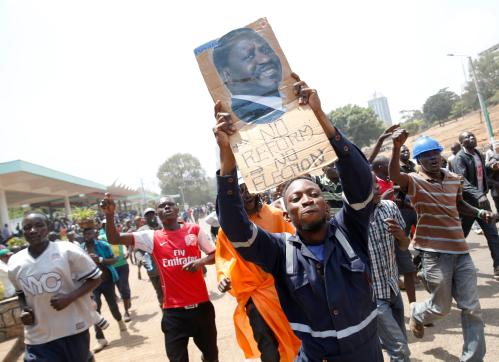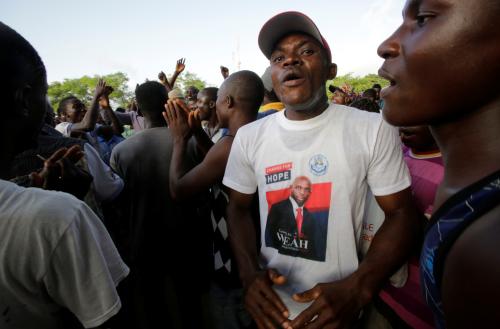Deadly explosions in Somalia’s capital kill at least 300 people
On Saturday, two vehicle-borne bombs exploded at busy intersections in the heart of Mogadishu. One of the bombs detonated next to a fuel truck, igniting a massive, fiery blast. City officials have confirmed that over 300 people died in the attacks, making them the deadliest bombings in Somalia’s history. Although no group has claimed responsibility for the attacks as of Friday, Somali government officials believe that the Islamist militant group al-Shabaab was behind the act. Al-Shabaab’s capacity to build such lethal bombs can be attributed to its acquisition of weapons and explosive materials from numerous raids on African Union Mission in Somalia (AMISOM) bases, according to an independent security analyst, Abdirahman Nur. Thousands of Somalis demonstrated on Wednesday in Mogadishu and other Somali cities to condemn those behind the terrorist attacks. Attacks seem to be on the rise: According to Sahan Research, a Nairobi-based think tank, 723 Somalis were killed in 395 bombings in 2016, up from 193 deaths in 265 bombings in 2015.
Turkey’s swift response to the crisis elicited praise from Somali officials and survivors of the attacks. In the wake of the blast, some of the severely injured victims were flown to Turkey for treatment while a Turkish military plane delivered medical supplies and medicine, and Turkish surgeons assisted Somali doctors and nurses in hospitals. Notably, Somali intelligence reports indicate that the newly inaugurated Turkish-built military base—which aims to train 10,000 Somali troops—was the original target of the assault.
Doubts over Kenya’s October 26 re-run election grow
As the re-run of this year’s Kenyan presidential election nears, there are growing doubts within the country over the credibility of the electoral process and whether the election will actually occur on October 26. After announcing his withdrawal from the election last week, opposition leader Raila Odinga this week called for protests on Election Day. According to Reuters, Odinga has also suggested that given his withdrawal from the process, it “should force the commission to start a fresh 90-day electoral cycle, including fresh candidate nominations.” These uncertainties around the election do not just stem from the opposition party: On Thursday, October 19, 15 professional and civil society associations in Kenya released a joint statement saying that October 26 was no longer a viable option for the election “citing upheavals in the electoral body and a failure by the presidential candidates to agree to terms of engagement.”
Members of the Independent Electoral and Boundaries Commission, the independent body in charge of overseeing the voting process, have also publicly raised concerns. On Wednesday, October 18, the chairman of Kenya’s election commission, Wafula Chebukati, publicly stated that he had been pressured to resign and that “under such conditions, it is difficult to guarantee a free fair and credible election.” Also on Wednesday, another member, Roselyn Akombe, resigned from the commission and fled to New York due to fear of recent anonymous threats. In an interview with The New York Times, she said, “[The threats are] not unfounded. We still have the unresolved brutal murder of Chris Msando, and I worked very closely with him.”
In other election news, Liberian elections were held last week, and the country’s National Election Commission announced final results on October 19, with George Weah of the Coalition for Democratic Change and current Vice President Nyumah Boakai of the Unity Party winning 38.4 percent and 28.8 percent of the vote, respectively. A runoff election will be held on November 7, as no candidate garnered the required 50 percent of votes required to win outright.
Rio Tinto faces US and UK fraud cases over Mozambique coal mining
On Tuesday, October 17, the United States Securities and Exchange Commission (SEC) and the United Kingdom’s Financial Conduct Authority announced actions against mining company Rio Tinto for fraud. The company is listed on the stock exchanges in both the United States and the United Kingdom.
The SEC announced its lawsuit in a federal U.S. court against Rio Tinto, former CEO Thomas Albanese, and former CFO Guy Elliott. The U.S. claims that, after a 2011 $3.7 million deal to buy Mozambique coal exporter Riversdale Mining, Albanese and Elliott discovered that the acquisition would yield lower quality and quantities of coal than they had expected. However, Rio Tinto continued to make positive public statements about the acquisition, bringing in around $5.5 billion from U.S. investors. They did not reveal the actual worth of the buy until 2013. In response to the charges, the company has released a statement denying wrongdoing, saying, “Rio Tinto believes that the SEC case is unwarranted and that, when all the facts are considered by the court, or if necessary by a jury, the SEC’s claims will be rejected.”
The U.K. actually settled this week with Rio Tinto over claims that it “breached accounting rules in connection with the Mozambique assets,” with a fine of $35.6 million—its largest ever. Rio Tinto has already faced allegations by the U.K.’s Serious Fraud Office over a 2011 payment to secure rights to a disputed Guinean iron ore deposit. The Australian Securities and Investments Commission is also looking into Rio Tinto’s accounting practices in Mozambique.
The Brookings Institution is committed to quality, independence, and impact.
We are supported by a diverse array of funders. In line with our values and policies, each Brookings publication represents the sole views of its author(s).






Commentary
Africa in the news: Terror attack in Somalia, election concerns in Kenya, and Rio Tinto’s fraud charge in Mozambique
October 20, 2017